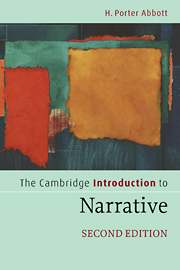Book contents
- Frontmatter
- Contents
- List of illustrations
- Preface
- Preface to the second edition
- Acknowledgments
- Chapter 1 Narrative and life
- Chapter 2 Defining narrative
- Chapter 3 The borders of narrative
- Chapter 4 The rhetoric of narrative
- Chapter 5 Closure
- Chapter 6 Narration
- Chapter 7 Interpreting narrative
- Chapter 8 Three ways to interpret narrative
- Chapter 9 Adaptation across media
- Chapter 10 Character and self in narrative
- Chapter 11 Narrative and truth
- Chapter 12 Narrative worlds
- Chapter 13 Narrative contestation
- Chapter 14 Narrative negotiation
- Notes
- Bibliography
- Glossary and topical index
- Index of authors and narratives
Chapter 4 - The rhetoric of narrative
- Frontmatter
- Contents
- List of illustrations
- Preface
- Preface to the second edition
- Acknowledgments
- Chapter 1 Narrative and life
- Chapter 2 Defining narrative
- Chapter 3 The borders of narrative
- Chapter 4 The rhetoric of narrative
- Chapter 5 Closure
- Chapter 6 Narration
- Chapter 7 Interpreting narrative
- Chapter 8 Three ways to interpret narrative
- Chapter 9 Adaptation across media
- Chapter 10 Character and self in narrative
- Chapter 11 Narrative and truth
- Chapter 12 Narrative worlds
- Chapter 13 Narrative contestation
- Chapter 14 Narrative negotiation
- Notes
- Bibliography
- Glossary and topical index
- Index of authors and narratives
Summary
The rhetoric of narrative
The rhetoric of narrative is its power. It has to do with all those elements of the text that produce the many strong or subtle combinations of feeling and thought we experience as we read. These include those elements that inflect how we interpret the narrative: that is, how we find meanings in it. Arguably, everything in the text contributes to its impact and our interpretation of it, and so everything has some rhetorical function. Change one thing, and the effect of the whole changes, if only subtly. As Barthes says, “everything in [the text] signifies…. Even were a detail to appear irretrievably insignificant, resistant to all functionality, it would nonetheless end up with precisely the meaning of absurdity or uselessness” (“Structural Analysis,” 261).
Who is exercising this power?
Note that when Barthes says that everything has a meaning he is not saying that the author of the text is necessarily in control of, or even aware of, the meaning of everything in the text. This is not to denigrate authors or to demean their often extraordinary gifts, but to acknowledge that interpreting texts is a complex transaction that invariably has to do with more than what the author consciously intended. The issue of meaning and its relation to the author is as important as it is vexed. I will return to this issue in Chapters Seven and Eight.
- Type
- Chapter
- Information
- The Cambridge Introduction to Narrative , pp. 40 - 54Publisher: Cambridge University PressPrint publication year: 2008



